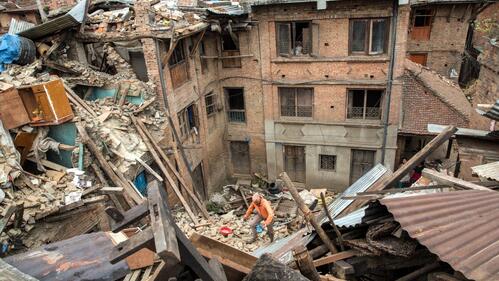Earthquakes
An earthquake is a sudden and rapid shaking of the ground caused by the shifting of rocks beneath the earth’s surface, or by volcanic or magmatic activity in the earth. Earthquakes strike suddenly, without warning, and can occur at any time. They can lead to death, injuries, property damage, loss of shelter and livelihoods and disruption of critical infrastructure. Most deaths are due to buildings collapsing or to secondary hazards, such as fires, tsunamis, flooding, landslides and release of chemicals or toxic materials.

Emergency appeals
Do you know how to prepare for and stay safe during an earthquake?
Assess and plan
Find out from local authorities where earthquake risks are highest in your area. Take time to identify the safest places in your home or building, including in each room. Safest places are located away from exterior walls, unsecured partition walls, windows, glass and heavy objects, and open fireplaces. Outside, you are safest in open areas away from both overhead and underground hazards such as trees, telephone poles, buildings.
Reduce risks
If building a new home, avoid building on unstable slopes, weak ground, or on top of, or within 15 metres of, known earthquake faults. Follow earthquake-resistant construction practices for new buildings and homes and repair or retrofit (adapt to make stronger) existing ones. Secure large belongings—such as bookcases, wardrobes or heaters—within your home that could fall, break or slide in an earthquake.
Prepare to respond
Learn how to run an earthquake drill and practice them regularly. Trust your instincts: when you feel any shaking you feel could be an earthquake, take immediate action. Go to the safest place you have identified, extinguish all flames and move away from windows, glass, exterior walls and unstable objects. If you are indoors, follow the 'drop, cover, hold on' procedure and remain calm.
